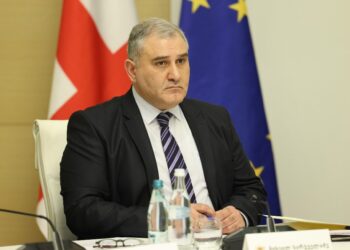Vladimir Putin said Russia has always been “ready for talks” to end the “tragedy” of war in Ukraine. Speaking at the virtual G20 meeting, the Russian president gave his most pacific comments yet since invading Ukraine, but then blamed Kyiv for the lack of peace talks.
His remarks have, unsurprisingly, not gone down too well with Kyiv.
Mykhailo Podolyak, adviser to the office of the Ukrainian president, said the comments were merely “another distortion of reality” by the Russian president.
“Murderers who commit a premeditated crime in cold blood, in the middle of it do not think how to stop the crime,” he wrote on X, adding that the only “workable solution” to end the war was for Russia to immediately withdraw all of its troops from Ukrainian territory.
“Afterwards, sit down to discuss payments, compensation, and other legal consequences of the war,” he said.
However, the talks that Putin mentioned are unlikely to be successful, as neither side appears ready to give up on their red lines.
For Ukraine, it wants to restore its full territorial integrity and push Russia out of the country entirely.
For Russia, accepting this would be seen as a surrender and it is unlikely to give up the currently occupied territories, especially Crimea – which it illegally annexed long before this war, in 2014.
Moreover, when it began its invasion, the Kremlin had hoped to bring Ukraine further into its sphere of influence and push it away from Euro-Atlantic security structures. But the invasion has had the opposite effect, and Ukraine will now likely become part of the EU and, later, NATO.
Important developments of the week include:
Volodymyr Zelensky said Ukraine’s troops faced “difficult” defensive operations on parts of the eastern front, as bitter winter cold settles in. But he added that forces in the south were still conducting offensive actions.
The death toll from a Russian strike on a Ukrainian hospital in Selydove rose to three. After Tuesday’s attack, rescuers spent the night clearing rubble and discovered further casualties.
The Russian foreign ministry said relations with the US were extremely thin and risked being torn at any moment. Spokesperson Maria Zakharova told reporters Washington’s actions could lead to “unpredictable consequences.”
Hungary’s prime minister, Viktor Orbán, is threatening to block Ukraine’s candidacy for membership of the EU. European leaders will meet on 14 and 15 December to discuss Ukraine’s EU bid.
The European Council president, Charles Michel, said he expected a “difficult” meeting next month about Ukraine joining the EU. He promised to do “everything in [his] power” to make a decision in December.
The EU has approved a further €1.5bn (£1.3bn) payment in macro financial assistance to Ukraine. It is the tenth payment made as part of an €18bn program to keep the Ukrainian economy moving.
Russia’s defense ministry said a group of Russian journalists had come under drone attack from Ukrainian forces in the Zaporizhzhia region. It said one reporter received medical treatment but no one was life-threateningly injured.
A Russian independent politician was summoned to a local prosecutor’s office after declaring her intention to run in next year’s presidential election. She has been critical of the regime.
The Kremlin said there were “no revisions” to its policy of pardoning prisoners in exchange for fighting in Ukraine. It followed local media reports of a Russian “satanist” killer who was released.
The Ukrainian air force said it shot down 14 Shahed drones launched by Russian forces overnight Tuesday. There were no immediate reports of casualties or major damage.
The US voiced concern that Iran may provide Russia with ballistic missiles for use in its war against Ukraine. The national security council spokesperson, John Kirby, said the development would probably be disastrous for the Ukrainian people.
The UN Human Rights Office said more than 10,000 civilians have been killed in Ukraine since Russia’s full-scale invasion. It expects the real toll is significantly higher.
Finland to close all but one Russia border crossing
One of the major developments of another week in Ukraine’s war against Russia’s invasion has been Finland’s prime minister Petteri Orpo saying the country will shut three border crossings – leaving just one open in its 1,340km border with Russia – after Helsinki accused the Kremlin of pushing hundreds of asylum seekers to the border in recent weeks.
Finland accuses Russia of facilitating organized illegal crossings. The border also marks the frontiers of NATO and the European Union. Estonia, another NATO and EU member, also says Russia is pushing asylum seekers to its border as a form of hybrid “warfare”.
Finland’s closures will begin at midnight on Friday. The Raja-Jooseppi crossing, in the far northern Lapland region, will remain open and asylum applications will be processed there, Reuters reports.
“The government has today decided to close more border posts,” Orpo told a press conference. “Raja-Jooseppi is the northernmost [crossing] and it requires a real effort to get there”.
Following Finland, Estonia has accused Russia of pushing asylum seekers to its border crossings.
The issue has become a point of contention between the two EU and NATO members and Russia, as they tussle over the fates of asylum seekers from often war-torn countries who have few possessions and face hostility and destitution.
Russian troops still attempting to encircle Avdiivka
After reports Russia is beginning to wind down its operations at the battered eastern city of Avdiivka, Ukraine’s latest battlefield update suggests there is still heavy fighting in the area.
“The occupiers are still trying to encircle Avdiivka,” Ukraine’s general staff reported.
It said Ukrainian forces repelled some 30 separate attacks from Russian forces in and around the city yesterday alone.
Elsewhere, it reported no engagements around Bakhmut, but said more than 100 settlements across the frontline were shelled by Russian forces despite worsening weather conditions.
It also noted four attacks around Robotyne (in Zaporizhzhia), where Russia has been trying to recover lost ground.
Compiled by Ana Dumbadze














